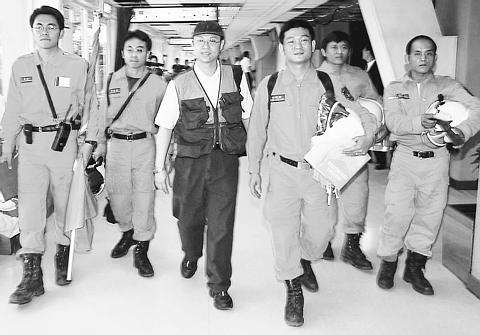Taiwan dispatched a rescue team to the Indonesian island of Sumatra yesterday to help with emergency aid and rescue work after a powerful earthquake hit the region on Sunday.
The seven-person team consisting of six emergency aid specialists from the Taipei County Government Fire Department and one doctor is the first ever from Taiwan to conduct search and rescue work overseas.
The team's 640kg of rescue gear includes sonar and infrared equipment used to search for survivors in collapsed buildings.

PHOTO: GEORGE TSORNG, TAIPEI TIMES. N
The team is also bringing along electric generators and satellite telephones.
Another medical team from the Taiwan Root Medical Peace Corp (TRMPC, 台灣路竹會) is to depart for the earthquake-torn island today along with several more rescue specialists from Pingtung County.
Both the Taipei and Pingtung emergency aid teams were established late last year after the catastrophic 7.3 earthquake on Sept. 21, that left 2,297 dead, approximately 8,400 injured and an estimated 100,000 homeless. The teams received four weeks of intensive training in Singapore earlier this year.
Over 20 countries sent rescue teams to Taiwan in the aftermath of the 921 quake.
Liu Ming-chun (
"We are bringing the basic medical supplies needed in earthquake relief along with equipment to set up a field clinic, if needed," Liu said.
"There has been limited time to prepare; we just received a request from the foreign minister this morning asking us to leave in a couple of hours," he added.
The TRMPC has undertaken other short stints previously. The group gave aid during the crisis in Macedonia caused by the fighting in Kosovo last spring and also went to Liberia in February.
Bengkulu, the western province of Sumatra, was rocked by a massive earthquake measuring 7.9 on the Richter scale late Sunday night, killing 117 and injuring 700 so far.
The US, Japan, Singapore, Spain, Switzerland, Belgium, Malaysia and Australia have all offered aid or emergency relief.
A team of Singaporean doctors arrived Tuesday with the first planeload of foreign relief while a 19-member medical team from Japan arrived yesterday.
The US embassy in Jakarta said yesterday that Washington has pledged US$25,000 in immediate assistance to the victims and was ready to give more if necessary.
Japan announced a US$140,000 emergency grant on Tuesday, providing tents, plastic sheeting and construction tools.
Australian Prime Minister John Howard said Canberra was sending US$143,000 worth of rapid-response aid and two emergency relief experts were on their way to assess the situation.
Officials at Taiwan's representative office in Jakarta said flights to Bengkulu are scheduled to operate today but the rescue team will travel to Sumatra by boat if necessary.
About 40 percent of Bengkulu City's electricity network was functioning again yesterday and water supplies were back on in some parts of town. Both had been knocked out by the quake.
Bengkulu seemed to be in a better state than Manna, the main city in the South Bengkulu district which appeared to have borne the brunt of the earthquake.

CHAOS: Iranians took to the streets playing celebratory music after reports of Khamenei’s death on Saturday, while mourners also gathered in Tehran yesterday Iranian Supreme Leader Ayatollah Ali Khamenei was killed in a major attack on Iran launched by Israel and the US, throwing the future of the Islamic republic into doubt and raising the risk of regional instability. Iranian state television and the state-run IRNA news agency announced the 86-year-old’s death early yesterday. US President Donald Trump said it gave Iranians their “greatest chance” to “take back” their country. The announcements came after a joint US and Israeli aerial bombardment that targeted Iranian military and governmental sites. Trump said the “heavy and pinpoint bombing” would continue through the week or as long

TRUST: The KMT said it respected the US’ timing and considerations, and hoped it would continue to honor its commitments to helping Taiwan bolster its defenses and deterrence US President Donald Trump is delaying a multibillion-dollar arms sale to Taiwan to ensure his visit to Beijing is successful, a New York Times report said. The weapons sales package has stalled in the US Department of State, the report said, citing US officials it did not identify. The White House has told agencies not to push forward ahead of Trump’s meeting with Chinese President Xi Jinping (習近平), it said. The two last month held a phone call to discuss trade and geopolitical flashpoints ahead of the summit. Xi raised the Taiwan issue and urged the US to handle arms sales to

State-run CPC Corp, Taiwan (CPC, 台灣中油) yesterday said that it had confirmed on Saturday night with its liquefied natural gas (LNG) and crude oil suppliers that shipments are proceeding as scheduled and that domestic supplies remain unaffected. The CPC yesterday announced the gasoline and diesel prices will rise by NT$0.2 and NT$0.4 per liter, respectively, starting Monday, citing Middle East tensions and blizzards in the eastern United States. CPC also iterated it has been reducing the proportion of crude oil imports from the Middle East and diversifying its supply sources in the past few years in response to geopolitical risks, expanding

An Emirates flight from Dubai arrived at Taiwan Taoyuan International Airport yesterday afternoon, the first service of the airline since the US and Israel launched strikes against Iran on Saturday. Flight EK366 took off from the United Arab Emirates (UAE) at 3:51am yesterday and landed at 4:02pm before taxiing to the airport’s D6 gate at Terminal 2 at 4:08pm, data from the airport and FlightAware, a global flight tracking site, showed. Of the 501 passengers on the flight, 275 were Taiwanese, including 96 group tour travelers, the data showed. Tourism Administration Deputy Director-General Huang He-ting (黃荷婷) greeted Taiwanese passengers at the airport and